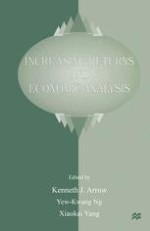1998 | OriginalPaper | Buchkapitel
An Analytical Framework of Consumer-Producers, Economies of Specialization and Transaction Costs
verfasst von : Mei Wen
Erschienen in: Increasing Returns and Economic Analysis
Verlag: Palgrave Macmillan UK
Enthalten in: Professional Book Archive
Aktivieren Sie unsere intelligente Suche, um passende Fachinhalte oder Patente zu finden.
Wählen Sie Textabschnitte aus um mit Künstlicher Intelligenz passenden Patente zu finden. powered by
Markieren Sie Textabschnitte, um KI-gestützt weitere passende Inhalte zu finden. powered by
Samuelson (1967) and Alfred Marshall (1920) consider the essence of economics as the analysis of demand and supply. However, there are two research lines of demand and supply. (1) is Marshall’s line: demand and supply are determined by the tradeoff between quantities of different goods consumed in raising utility and the tradeoff between quantities of different factors in raising output. Relative demand in equilibrium is determined by relative taste, relative technology and relative endowments. Aggregate demand is not the focus of the analysis and is given by the dichotomy between pure consumers and pure producers. In other words, resource allocation is the focus in neoclassical economic theory. Most resource allocation problems are solved in mathematical programming models. (2) is Allyn Young’s line: demand and supply are two sides of the level of division of labour (or its reciprocal the degree of self-sufficiency). The level of specialization and division of labour determines the extent of the market and aggregate demand and supply (Young, 1928, p. 539). Hence, we cannot understand what are demand and supply if we do not know the mechanism that determines individuals’ level of specialization and the level of division of labour for a society as a whole.
